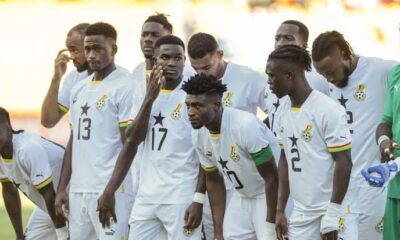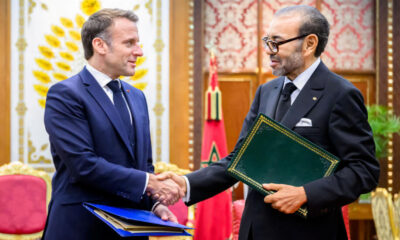In a conversation with my wife a couple of weeks ago, I told her we are living in a historic moment in Morocco’s centuries-old and rich history. My main contention was that Morocco’s string of unprecedented sporting, economic, and diplomatic triumphs over the past year or so heralded something memorable, momentous. Morocco, I argued, has been on the right path to becoming a major and indispensable player on both the sporting and economic fronts.
As the winds of prosperity and success continued to blow in Morocco’s direction, the African Confederation of Football (CAF) added to the sense that this could finally be Morocco’s time by granting the North African country the hosting rights of the 2025 Africa Cup of Nations (AFCON).
Yet no sooner had that momentous victory for Moroccan football entirely sunk in that, on Wednesday, October 4, FIFA’s executive committee announced its unanimous decision to designate the joint Morocco-Spain-Portugal bid as the host of the 2030 FIFA World Cup.
With this decision, Morocco has now entered the select club of eighteen countries that have hosted the World Cup since 1930. There is one small yet highly significant detail that speaks volume about the importance both FIFA’s executive committee and the Spanish and Portuguese football federations place in Morocco’s contribution to the joint bid.
Last March, it was King Mohammmed VI not FIFA, who announced Morocco’s decision to join Portugal and Spain in bidding to host the 2030 World Cup. Similarly, it was the Moroccan Royal Cabinet, not FIFA nor the Spanish or Portuguese government, that broke the news yesterday of the FIFA executive board’s historic decision to grant the three countries the hosting rights of the centenary edition of the world’s most prestigious football tournament.
As such, it would hardly be an overstatement to argue that Morocco’s choice to join the Iberian bid was a tie-breaker in the FIFA’s decision to select the winning bid. Due to its rising diplomatic, political, economic, and athletic clout in Africa, as well as its status in the Arab world, Morocco surely made it possible for the Euro-African bid to win the votes of both African and Arab federations.
Indeed, as recently as last week, CAF President, Patrice Motsepe, was adamant that all African countries would cast one single vote in favor of the joint Morocco-Portugal-Spain bid. In this sense, not only did Morocco bring the joint bid the considerable weight of African votes, but it also brought it the potential support of several Arab and Muslim countries from Asia. In mathematical terms, Morocco alone contributed around 70 votes to the bid’s success.
With these votes and the 54 votes that Spain and Portugal were sure to secure from Europe, there was no doubt that the Iberian and North African de facto became the designated bid to of the FIFA executive committee, leaving no chance to the joint South American bid in what ultimately proved to be a ridiculously unbalanced race for the hosting rights of the 2030 World Cup. This explains why, for the first time in the past seven decades, FIFA had to select the hosts of the World Cup without going through the usual voting process.
There is a saying in Morocco: “When good fortune comes to our door, it comes with a vengeance.” This is exactly what appears to be happening to Morocco at the moment. Morocco has not hosted a major tournament since it last hosted the African Cup of Nations in 1988.
Being the first African and Arab nation to make it out of the World Cup group stages at the 1986 World Cup in Mexico, Morocco was already widely regarded back then as one of Africa’s greatest footballing nations. Indeed, it was Morocco’s outstanding performance at that World Cup that prompted FIFA to increase the number of African teams at the World Cup from two in 1986 to three in 1990. In 1988, Morocco became the first African and Arab nation to join the race for hosting the World Cup– the country initially bid to host the 1994 iteration of the global tournament, but the hosting rights of that World Cup went to the United States.
Following that first attempt, Morocco made four more bids (1998, 2006, 2010, and 2026), but unfortunately lost every time. Morocco came close to winning in all its bidding efforts, except for the 2006 World Cup attempt when the Moroccan bid was eliminated in the first round of voting. Although Morocco’s repeated attempts to win the World Cup hosting rights were unsuccessful, they nevertheless paved the way for African and Arab nations to be recognized as potential hosts of the global tournament.
As such, Morocco could be considered a trailblazer for other African and Arab nations. Morocco’s persistence to compete with other nations fostered a belief in African and Arab countries that they have a chance and a right to host the global tournament and break away from FIFA’s tendency to rotate hosting between Europe and the Americas. It encouraged other countries to consider themselves as worthy contenders to host what is widely considered to be the world’s most illustrious football event.
But after a relatively memorable performance at the 1986 World Cup in Mexico, Morocco’s Atlas Lions largely disappointed on the world stage until the 2022 World Cup in Qatar. At the 1994, 1998, and 2018 World Cups, the Atlas Lions were outgunned and eliminated in the group stage. Although the Moroccan team showcased world-class talent, playing an attractive and enjoyable style of football at these tournaments, they always came short of moving to the next level.
During the 1998 World Cup hosted in France, Morocco came close to making it to the second round. Millions of Moroccans are still haunted by the cruel memory of their country’s heartbreaking elimination from that World Cup after Norway scored a last-minute winning goal against Brazil.
However, the tables turned during the 2022 Qatar World Cup, when Morocco captured global attention with its historic performances, including victories over top-tier teams. Above all else, Morocco’s historic qualification made it the first African and Arab country to reach such a milestone. As a result, the country yet again became the trailblazer that inspired other underdogs to dream of breaking World Cup barriers in the near future. It is as if Moroccan football’s destiny is to be a barrier-breaker, some might be tempted to argue. And, to put it mildly, such an argument would be far from farfetched or unreasonable.
Like their male counterparts in 1986, who were the first African and Arab team to make it out of the World Cup stage, Morocco’s Atlas Lionesses became this year the first Arab team to both qualify both for the World Cup and advance to its round of 16.
The awe, admiration and enthusiasm that this performance elicited in the whole world has undoubtedly contributed to a significant boost to Morocco’s reputation, providing the North African country with a new and effective tool of soft power to gain the sympathy and affection of many across the world.
Unlike many countries in its neighborhood, Morocco’s rich history, vibrant culture, breathtaking landscapes, delicious food, and hospitable people have made it a favorite destination for millions worldwide. As someone who has lived away from Morocco for the past 23 years, I can attest to this reality.
Whether in France, Spain, or the United States, people from all walks of life routinely express admiration for Morocco’s rich history and captivating culture. Unlike other countries in the region that lack similar soft power, Morocco often receives free publicity from numerous world-acclaimed individuals, without having to spend hundreds of millions of dollars to obtain positive endorsements.. In recent years, celebrities such Oprah, Madonna, Mariah Carey, to name but a few, have on numerous occasions expressed their admiration for Morocco’s culture and the hospitality of its people.
Following the earthquake that struck Morocco on September 8, the global community’s impressive display of solidarity with the Moroccan people spoke volumes about Morocco’s reputation as a reliable, progressive and welcoming nation, constantly striving to serve as a bridge between different cultures and continents. From Morocco’s perspective, FIFA’s decision to award the World Cup hosting rights to the joint Morocco-Spain-Portugal bid reflects the confidence regional and global organizations have in the North African country. More importantly, the decision emphasizes Morocco’s status as a rising regional and continental sporting powerhouse.
Ultimately, beyond its positive impact on Morocco’s global reputation, hosting the global tournament in Morocco will undoubtedly accelerate the pace of development that the country has seen in recent years.
Samir Bennis is the co-founder of Morocco World News. You can follow him on Twitter @SamirBennis.







































